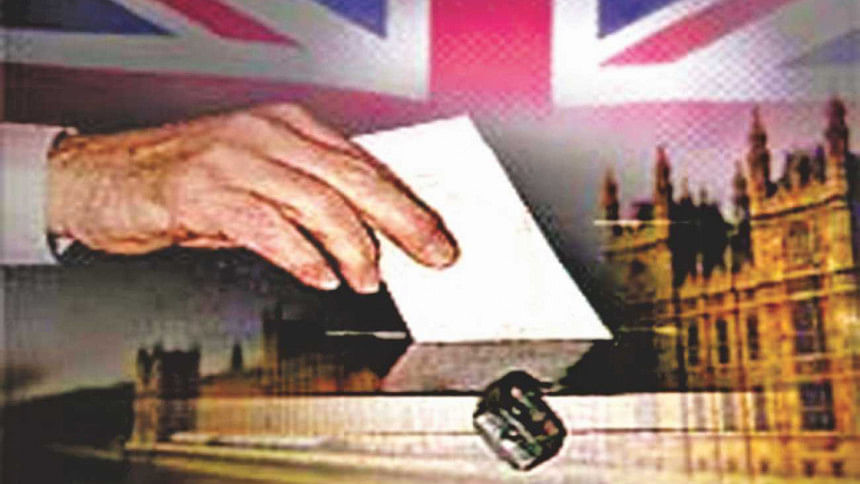Britain's economy: Between a rock and a hard place

Most economists view Brexit as something seriously negative for the economy of the UK. Although negotiations for leaving the EU are yet to begin, the pound sterling has already plummeted and inflation has started to slow consumption and growth. But things could get much worse.
Look at the electorate's options in the elections called by Theresa May for June 8, meant to strengthen her hand for the best exit deal from the EU. To the dismay of many she has opted for a 'hard Brexit', outside both the Single Market and the Customs Union. She even declared her government to be ready for 'no deal' rather than a 'bad deal'. Promising a strong and stable government, she expected a landslide victory, based not only on her own strong personal ratings but also on the collapse of the Labour Party under its new, widely scorned left winger, Jeremy Corbyn. Yet suddenly, her initial 20 percent lead in the polls shrank to 5 percent, although she and her Conservative Party are still thought to be ahead. The Conservatives could even now lose, especially if the Liberal Democrats, with 10 percent, were to accept an alliance with Labour in a hung parliament.
Labour's manifesto would put the clock back by re-nationalisations. It would reverse Conservative 'austerity' cuts to social welfare, 'save' the NHS and abolish student loans needed to pay for university education. These expensive promises, to be paid for by higher taxes on businesses and the rich, seem appealing to many of the same people who deserted Labour to vote for the United Kingdom Independent Party (UKIP). Then they scorned the established politicians and experts whose warnings against Brexit were dismissed as 'Project Fear'. They now seem equally ready to ignore economists and business leaders.
It remains to be seen whether distrust of Jeremy Corbyn as a potential leader can still swing the election for Theresa May. Corbyn's image has improved during the short campaign, whereas May's reliance on a very narrow circle of advisers, brought with her from the Home Office, is increasingly criticised. Businesses accuse her of 'not listening', and most see 'no deal' as a disaster. Even a narrow election victory would still be a disaster for the Prime Minister, especially ahead of tough negotiations with an increasingly united EU. May's aim is a continuation of tariff free trade with the EU, without customs delays. This would be to the advantage of industry supply chains on both sides and would represent the old UK aspiration of the EU as little more than a free trade area, leaving continental Europe free to develop more integration. But the 27 other EU members fear this would so reward Brexit as to risk the EU's disintegration. They presented an exit bill of some 100 billion Euros as a first item of negotiation.
The prospects for the UK economy look serious, whichever party wins the elections. Its solid, though slow, recovery from the financial crash of 2008 still leaves both a continued high budget deficit and a current account deficit. Its stability rests on the continued confidence of global investors and lenders. London's role as a world financial centre has solid foundations but a 'hard Brexit' would lead to losses of some financial activities and damage confidence in the wider economy. The UK industrial base is too small to compensate even by increased exports and would be hard hit by loss of easy access to the EU as its largest market and loss also of the foreign investment based on that access. London subsidises much of the rest of the UK, including Scotland, Wales and Northern Ireland. Central revenue losses would especially hit these weaker regions. Agriculture fears that high EU subsidies might not be replaced. The NHS, Britain's universities and its strong science base are among those openly worried over the prospect of reduced inward migration and loss of easy cooperation with EU institutions.
Nor would a Labour victory be any better under Jeremy Corbyn. Its manifesto claims that the sweeping expenditure increases would be paid for by taxing rich companies. It resembles President Trump's doomed budget proposals, since they both rest on wild growth assumptions and double counting. It is true that despite the UK's deficits, there is, at the current minimal global interest rates, a case for expanded borrowing for investment in infrastructure and technical training - a Keynesian stimulus. But how long would rates stay low if markets faced the sudden prospect of a left wing Corbyn government? The pound could well fall further and the city would be hit by capital flight.
Both extremes may still be avoided. The exposure of global equity funds has continued to rise in the UK. The FTSE 100 index, which represents large firms, is at a record high, many confident that they can continue to do well despite Brexit, especially now that EU economies seem back to solid growth. Compromises could emerge, some no doubt painful. Some speculate that if years of tough negotiations fail to reach an agreement the 'remainers' might force another referendum for withdrawal of the Brexit bid. The EU may itself change to more flexible forms of membership.
The election of June 8 is the next major step in what is going to be a long and hard drama, for both sides, but especially for the United Kingdom and its economic future.
The writer is a former ambassador.

 For all latest news, follow The Daily Star's Google News channel.
For all latest news, follow The Daily Star's Google News channel. 



Comments